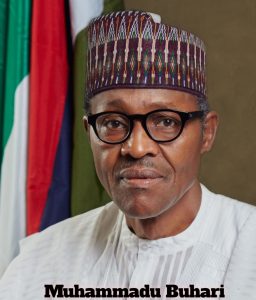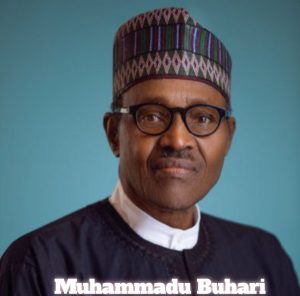
December 17, 1942 – July 13, 2025
Muhammadu Buhari Early Life and Formative Years:
Muhammadu Buhari was born on December 17, 1942, in Daura, an ancient town in Katsina State, northern Nigeria. Born into a prominent Fulani family, he was the twenty-third child of Mallam Hardo Adamu, a respected Fulani chief and cattle herder. His mother, Zulaihat, became his primary caregiver after his father’s death when Buhari was approximately four years old.
Buhari’s early education began at local primary schools in Daura and Mai’adua before advancing to Katsina Middle School in 1953. He later attended Katsina Provincial Secondary School (now Government College, Katsina) from 1956 to 1961, where he distinguished himself as a disciplined student with natural leadership qualities.
In 1962, Buhari enrolled at the Nigerian Military Training College (NMTC) in Kaduna, which later became the Nigerian Defence Academy. His military education extended internationally, including officer training at Mons Officer Cadet School in Aldershot, United Kingdom, with additional specialized training in India and the United States, focusing on military strategy, leadership, and logistics.
Muhammadu Buhari Military Career and Rise to Prominence:
Commissioned as a second lieutenant in the Nigerian Army in 1963, Buhari’s military career coincided with one of Nigeria’s most turbulent periods. He gained national recognition during the Nigerian Civil War (1967-1970), where he served as a field commander, demonstrating tactical acumen and leadership under pressure.
Following the civil war, Buhari assumed various strategic positions, including Military Secretary at Army Headquarters and Governor of the then North-Eastern State (comprising present-day Borno, Yobe, Taraba, Adamawa, Bauchi, and Gombe States) from 1975 to 1976 under General Murtala Mohammed’s administration.
Between 1976 and 1978, Buhari served as Federal Commissioner for Petroleum and Natural Resources under General Olusegun Obasanjo’s military government. In this role, he played a crucial part in establishing the Nigerian National Petroleum Corporation (NNPC), which became central to Nigeria’s oil industry management.
His appointment as General Officer Commanding (GOC) of the 3rd Armoured Division in Jos in 1980 positioned him at the center of Nigeria’s military establishment, setting the stage for his subsequent rise to national leadership.
Muhammadu Buhari Military Head of State (1983-1985):
On December 31, 1983, Major General Muhammadu Buhari led a bloodless military coup that toppled the democratically elected government of President Shehu Shagari. The coup was justified by citing widespread corruption, economic mismanagement, and the breakdown of national discipline under civilian rule.
As Head of State, Buhari implemented sweeping reforms through his signature “War Against Indiscipline” (WAI) campaign, which sought to restore order, punctuality, and civic responsibility to Nigerian society. Queue culture was enforced, environmental sanitation was mandated, and public servants were required to demonstrate greater efficiency and accountability.
His anti-corruption drive resulted in the arrest and prosecution of numerous politicians and public officials, recovering substantial stolen funds. However, his administration also faced criticism for authoritarian tendencies, including the detention of journalists, restrictions on press freedom, and the passage of restrictive decrees that limited civil liberties.
Economically, Buhari pursued policies of self-reliance and import substitution, aimed at reducing Nigeria’s dependence on foreign goods and strengthening the naira. While these policies reflected nationalist ideals, they were criticized for their rigidity during a period of global economic challenges.
His government came to an abrupt end on August 27, 1985, when General Ibrahim Babangida staged a palace coup. Buhari was subsequently detained for nearly three years, during which time he maintained his composure and dignity despite the circumstances.
Also Read: Archita Phukan Biography | Identity & Rise to Fame, Social Media Influence.
Muhammadu Buhari Political Awakening and Democratic Ambitions:
After his release from detention in 1988, Buhari retreated to his hometown in Daura, focusing on farming and private business ventures while maintaining a keen interest in national affairs. He emerged as a vocal critic of corruption and poor governance, gradually building a reputation as an elder statesman committed to national transformation.
Buhari’s return to active politics began in 2003 when he contested the presidential election on the platform of the All Nigeria Peoples Party (ANPP), losing to incumbent President Olusegun Obasanjo. Undeterred, he ran again in 2007 under the same party, this time losing to Umaru Musa Yar’Adua.
In 2011, representing the Congress for Progressive Change (CPC), Buhari made his third presidential bid, losing to Goodluck Jonathan. These consecutive defeats, rather than discouraging him, strengthened his resolve and enhanced his image as a persistent advocate for change.
The formation of the All Progressives Congress (APC) in 2013 through the merger of several opposition parties provided Buhari with the broader political platform he needed. His selection as the APC’s presidential candidate for the 2015 elections marked a turning point in his political career.
Muhammadu Buhari The Democratic Presidency (2015-2023):
Historic Victory and First Term (2015-2019)
In March 2015, Muhammadu Buhari achieved a historic milestone by becoming the first opposition candidate to defeat an incumbent president in Nigeria’s democratic history. His victory over President Goodluck Jonathan was built on a campaign platform emphasizing three key pillars: fighting corruption, improving security, and revitalizing the economy.
During his first term, Buhari launched an aggressive anti-corruption campaign, strengthening institutions like the Economic and Financial Crimes Commission (EFCC) and the Independent Corrupt Practices Commission (ICPC). The Treasury Single Account (TSA) policy was implemented to consolidate government revenues and reduce fiscal leakages.
His administration made significant progress against the Boko Haram insurgency in northeastern Nigeria, reclaiming territories previously under terrorist control and reducing the frequency of attacks. However, new security challenges emerged, including farmer-herder conflicts and banditry in various parts of the country.
Economically, Nigeria experienced a recession in 2016, the country’s worst economic downturn in decades. Buhari’s administration gradually implemented recovery measures, leading to modest economic growth in subsequent years. However, his approach was criticized for being slow and overly bureaucratic.
His health became a subject of national concern when he spent several months in London receiving medical treatment in 2017, raising questions about leadership continuity and transparency in governance.
Also Read: Siddharth Kaushal Biography: IPS Officer, Innovator & Trailblazer
Muhammadu Buhari Second Term and Consolidation (2019-2023):
Buhari’s re-election in 2019, defeating Atiku Abubakar of the People’s Democratic Party (PDP), provided him with an opportunity to consolidate his reform agenda. His second term focused heavily on infrastructure development, with massive investments in roads, railways, and power generation projects.
The administration launched several Social Investment Programmes (SIPs), including N-Power, designed to address youth unemployment and poverty. These programs reached millions of Nigerians and provided crucial support during economic difficulties.
However, his second term was marked by escalating security challenges. Banditry and kidnapping became widespread, particularly in the northern regions. The #EndSARS protests of 2020, which called for police reform and good governance, drew international attention and highlighted persistent governance challenges.
Despite these challenges, Buhari’s administration made notable achievements in agriculture, with increased food production and reduced dependence on imports. The petroleum industry witnessed significant reforms, including the passage of the Petroleum Industry Act (PIA) after decades of legislative delays.

Muhammadu Buhari Post-Presidency and Final Years:
On May 29, 2023, Muhammadu Buhari completed his constitutionally mandated two terms and handed over power to his successor, Bola Ahmed Tinubu of the APC. After successfully completing his second tenure as president of the Federal Republic of Nigeria and handing over power to Asiwaju Bola Ahmed Tinubu of the All Progressives Congress (APC) on May 29, 2023, former President Muhammadu Buhari returned to his hometown, Daura in Katsina State the same day.
Initially, Buhari settled in Daura as planned, though reports later indicated he had relocated to Kaduna State while maintaining his connections to his ancestral home. After he left office on May 29, 2023, he moved to the UK and later relocated to Kaduna State from Daura, Katsina. His retirement was marked by his characteristic low profile and distance from active politics.
In his final years, Buhari maintained his interest in agriculture and remained a respected elder statesman. Some days ago, it was reported that he was ill and was taking treatment in a London health facility.
Muhammadu Buhari Death and Legacy:
Muhammadu Buhari died on July 13, 2025, in London, United Kingdom, while receiving medical treatment. He was 82 years old at the time of his death. Buhari, Nigeria’s 15th president and a retired military general, served two terms between 2015 and 2023, and remained a prominent figure in national and regional politics even after leaving office.
His death marked the end of an era in Nigerian politics. Buhari, a former military ruler-turned-elected president, promised to fight corruption and insecurity but left office with many of the same issues unresolved.
Muhammadu Buhari Personal Life and Character:
Buhari was known for his austere lifestyle, unwavering discipline, and incorruptible character. He was married to Aisha Buhari, and together they had several children, including Zahra Buhari-Indimi, who became a public figure in her own right. His first wife, Safinatu, whom he divorced in 1988, died in 2006.
Throughout his life, Buhari maintained strong Islamic values and was deeply connected to his Fulani heritage. He was known for his love of cattle rearing and farming, often spending time at his farm in Daura when not engaged in official duties.
Muhammadu Buhari Assessment and Historical Significance:
Muhammadu Buhari’s life and career spanned over six decades of active public service, making him one of Nigeria’s most enduring political figures. His journey from a small town in northern Nigeria to the highest office in the land exemplifies determination, resilience, and unwavering commitment to his ideals.
As a military leader, he was remembered for his discipline and anti-corruption stance, though his methods were often criticized as authoritarian. As a democratic president, he was praised for his personal integrity and infrastructure development, while facing criticism for economic performance and security challenges.
His supporters celebrated him as a leader who fought corruption and maintained Nigeria’s unity, while critics argued that his policies were sometimes ineffective and that he failed to adequately address the country’s persistent challenges.
Regardless of political perspectives, Buhari’s impact on Nigeria’s political landscape is undeniable. He represented a bridge between military and civilian rule, and his multiple attempts at democratic leadership demonstrated the possibility of political transformation and redemption.
His legacy will be debated for generations, but his commitment to the vision of a corruption-free, secure, and economically independent Nigeria remains his most enduring contribution to the nation’s political discourse.
Muhammadu Buhari Conclusion:
Muhammadu Buhari’s death marks the end of a remarkable journey that began in a small town in northern Nigeria and culminated in the highest office in Africa’s most populous nation. His life story is one of perseverance, principle, and public service, spanning the military and civilian eras of Nigeria’s political development.
Whether viewed as a disciplined leader who fought corruption or as a leader whose policies fell short of expectations, Buhari’s place in Nigerian history is secure. His passing represents not just the loss of a former president, but the end of an era in Nigerian politics, leaving behind a complex legacy that future generations will continue to evaluate and interpret.
His funeral, scheduled to take place in Daura, will undoubtedly draw leaders from across Nigeria and beyond, paying tribute to a man who dedicated his life to the service of his country, for better or worse, with unwavering conviction and characteristic dignity.
